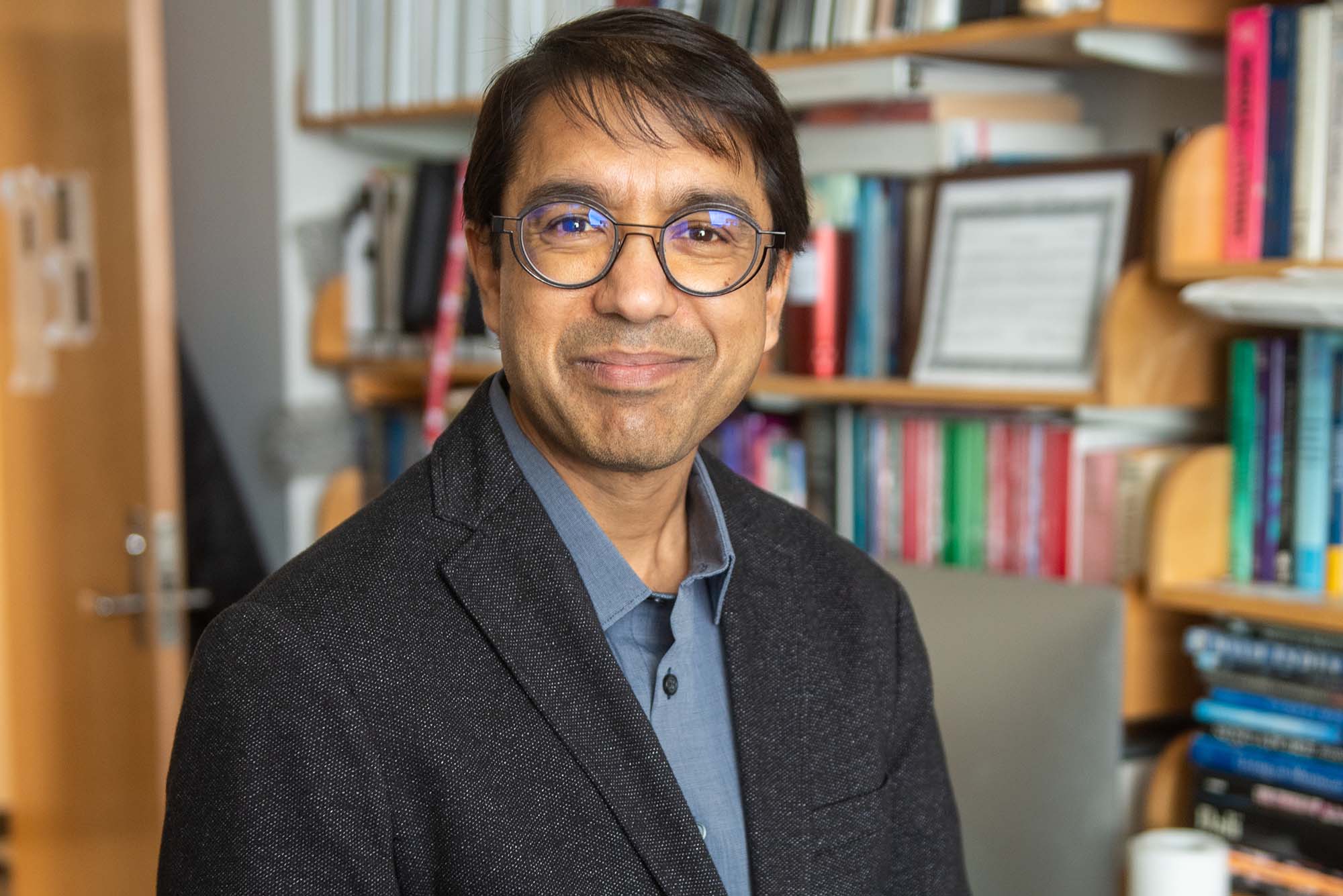BU Electrical Engineer Vivek Goyal Named a 2024 Guggenheim Fellow
The award recognizes Goyal’s groundbreaking work in computational imaging, including research to photograph objects hidden by walls and around corners

New Guggenheim Fellow Vivek Goyal, a College of Engineering professor of electrical and computer engineering.
BU Electrical Engineer Vivek Goyal Named a 2024 Guggenheim Fellow
The award recognizes Goyal’s groundbreaking work in computational imaging, including research to photograph objects hidden by walls and around corners
He might spend his days testing computer chips for the most minute of devices, or developing tech spies could use while on covert assignments. But if you ask Vivek Goyal, a Boston University College of Engineering professor and associate chair of doctoral programs for electrical and computer engineering, to name one of the coolest things about his job, he doesn’t pick inventing technology or testing gadgets.
“I really love the generation and analysis of probabilistic models,” Goyal admits.
These prediction-making algorithms might not be as glamorous as aiding secret agents, but they play a critical role in his burgeoning research on improving microscope imaging. That research is in part what earned Goyal a Guggenheim Fellowship, a prestigious grant from the John Simon Guggenheim Memorial Foundation.
Each year, the foundation awards approximately 180 fellowship grants to individuals making significant contributions in the natural sciences, the social sciences, the creative arts, and the humanities. “Guggenheim Fellowships are intended for mid-career individuals who have demonstrated exceptional capacity for productive scholarship or exceptional creative ability in the arts and exhibit great promise for their future endeavors,” according to the foundation’s website.
“Vivek is the third College of Engineering faculty member to be awarded a Guggenheim Fellowship in recent years, which speaks to the outstanding depth and quality of research at the college,” says Elise Morgan, ENG dean ad interim. “Professor Goyal is a preeminent scholar and outstanding member of our faculty. His research on non-line-of-sight imaging—at the intersection of optics/photonics and computers and mathematics—has great potential for making the world safer for many people.”
Goyal came to BU in 2014. Since then, his research has largely revolved around computational imaging—such as photon-efficient active imaging, where he’s shown how few photons are actually needed to capture crisp images with a camera, and non-line-of-sight imaging, where he uses surprisingly simple equipment to take photos of objects hidden from view. In one study, Goyal and his team used a pulsed laser and a single-photon detector array to take pictures of a post, mannequin, and staircase placed behind a wall, as well as to track moving objects. Goyal says the technology could eventually be used to aid rescue and armed forces teams, and to potentially improve vehicle warning systems.
“It is an incredible honor for Professor Goyal to join the exceptional group of artists, writers, scholars, and scientists awarded a Guggenheim Fellowship this year,” says Gloria Waters, BU’s vice president and associate provost for research. “This award, along with the multiple other distinguished awards he has received, is a clear recognition of the importance of his cutting-edge research.” Last year, Goyal was also named an American Association for the Advancement of Science (AAAS) Fellow.
This award, along with the multiple other distinguished awards he has received, is a clear recognition of the importance of his cutting-edge research.
Recently, his research has also involved electron microscopes, high-resolution microscopes that form images of a specimen using a focused beam of particles, such as electrons or ions, instead of photons. His groundbreaking work in electron imaging has significant potential implications for biomedicine and manufacturing, among myriad other applications.
According to Goyal, his microscopes research is exciting, even a little off-the-wall, because it upends what have long been considered the fundamental limits of electron imaging.
“One thing I love about the Guggenheim Fellowship is that it’s an award based on both what you say you plan to do, but also on your track record of creativity,” Goyal says. “It’s very validating to feel like my track record was valued enough that this foundation wants to support me in trying to do something a little crazy.
“I take that compliment, and I appreciate it.”


Comments & Discussion
Boston University moderates comments to facilitate an informed, substantive, civil conversation. Abusive, profane, self-promotional, misleading, incoherent or off-topic comments will be rejected. Moderators are staffed during regular business hours (EST) and can only accept comments written in English. Statistics or facts must include a citation or a link to the citation.